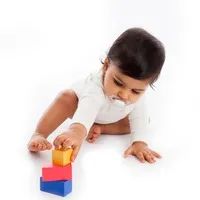The Ten Secrets of Montessori - #3 The Absorbent Mind
"The absorbent mind is one of the most important ideas in early childhood education. The absorbent mind makes our adult lives possible." - Mary Ellen Maunz
The Ten Secrets of Montessori

Maria Montessori uncovered secrets--ten to be exact. Lucky for us, Mary Ellen Maunz, M. Ed., founder and Program Director of Age of Montessori, is willing to share the treasure of information within these secrets, and to explain exactly what they can mean to you and your children. With these ten secrets, you will gain a rich understanding of the framework beneath the Montessori Method. Maria Montessori developed more than a revolutionary educational method; she discovered the true inner workings of the child’s mind. These ten secrets are based on her lifetime of observing children and recognizing what they really need to thrive.
Secret #3 The Absorbent Mind
"It begins with a knowledge of his surroundings. How does the child assimilate his environment? He does it solely in virtue of one of those characteristics that we now know him to have. This is an intense and specialized sensitiveness in consequence of which the things about him awaken so much interest and so much enthusiasm that they become incorporated in his very existence . The child absorbs these impressions not with his mind but with his life itself." - Maria Montessori, The Absorbent Mind
During the first six years of life, children have a very different way of learning than adults.

One of Maria Montessori’s most important and fundamental discoveries was what she called “the absorbent mind.” During the first six years of life, children have a very different way of learning than adults. At this age, children have sponge-like brains; they are able to soak up vast amounts of information from their environment. And they do so effortlessly, continuously, and indiscriminately.
The child has a different relation to his environment from ours... the child absorbs it. The things he sees are not just remembered; they form part of his soul. He incarnates in himself all in the world about him that his eyes see and his ears hear. ~Maria Montessori, The Absorbent Mind.
The young child’s brain is hardwired to learn at an incredible rate. When you think about all that the child accomplishes in those first years (non-verbal and verbal communication, small and large motor control, emotional and social skills, and so much more,) it is mind boggling.
“…if we compare our ability as adults to that of the child, it would require us sixty years of hard work to achieve what a child has achieved in these first three years.” ~Maria Montessori, The Absorbent Mind
The (HUGE) Importance of the Absorbent Mind Stage
Children develop 85% of their core brain structure by the time they are five years old.

How does the child do it? With their amazing absorbent mind! Maria Montessori goes on to explain that during the absorbent stage, children are constructing their individuality, or building themselves into the adult they will ultimately become. The development that takes place during the child’s first six years is vitally important. Children develop 85% of their core brain structure by the time they are five years old. And, the child will build on this core foundation throughout the rest of his life.
“Impressions do not merely enter a child’s mind; they form it.” ~ Maria Montessori
Unconscious Absorbent Mind Stage
Maria Montessori separated the absorbent mind stage into two sub-stages: the unconscious and conscious stage.

Maria Montessori separated the absorbent mind stage into two sub-stages: the unconscious and conscious stage. From birth to age three, the child absorbs information unconsciously or unknowingly. He (or she) learns to sit, stand, walk, use their hands, and speak, etc., without conscious effort. The child is developing his basic “faculties” or functions through mimicry. Children in this phase will mimic what they see. They are preparing themselves for the next phase: the conscious phase.
Conscious Absorbent Mind Stage
From three to approximately six years of age, children pass into the conscious stage of development. They still have sponge-like minds that absorb information easily, but now they will consciously seek certain experiences. Children in this phase are expanding their newly developed faculties and abilities. They are predisposed toward learning things like order, sequencing, early math, music, and letter shapes and sounds, all of which eventually lead to math, reading, and writing skills. They will also continue to refine their control of movement, balance, and basic physical mechanisms during this phase. Children in the conscious stage of development will demonstrate an innate (and often intense) desire to make choices for themselves and to accomplish tasks independently. Maria Montessori referred to this as the ‘help me do it myself’ stage.
The young child’s absorbent mind has a singular capacity to absorb information from the environment. Studies have shown that certain parts of the brain will not develop without stimulation during these early, formative years. As development is sequential, these early foundations are essential for incorporating concepts that are more complex. To learn more about the absorbent mind, join us for Age of Montessori’s 6-week online Child Development Course. Here is a brief introduction...
Parents! Learn to meet your child's needs at every stage! Different Ages/Different Needs: Understanding the Stages of Development.




















